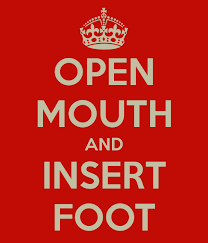President Donald Trump
The “Trump Effect” in the Workplace
There are so many excuses for stupid or harassing behavior in the office.
Posted July 20, 2015

Donald Trump is a practitioner of what my father, Dr. Karl Albrecht (found here on this site), calls “ballistic podiatry,” as in, he keeps shooting himself in one foot and then the other. The wound in his left hoof barely heals before he fires another bullet into his right one. He has confused being provocative and interesting with being boorish and ill-informed. Not surprisingly, these are not uncommon communication traits in the office as well.
A lot of insensitive, racist, misogynistic, homophobic, ageist, harassing, or hateful things supervisors or employees say to or about each other, or about what they see or hear on the usual or social media sites, is either done without malice or will full intention. Sometimes it’s an accident and other times they know full-well what they are saying. When corrected on these unkind things by their bosses or bravehearted co-workers (it takes courage to confront them), the office bigmouths, know-it-alls, and pot-stirrers offer several common excuses as to why they feel so entitled. See if these sound familiar:
“We’re too politically correct around here.”
Which means if you don’t agree that my politics are more correct than your politics, it’s your fault.
"I’m too 'old school' to change."
Which means I’m brittle, inflexible, and have what my dad calls “hardening of the categories.”
"I miss the old days, where you could say what you wanted without getting arrested by the 'Behavior Police.'”
Which means I have my own specially-marked chair in the HR office because I’m in there a lot for my poor selections of words, choices, and actions.
"Lighten up! I was just kidding around. Where’s your sense of humor?"
Which means if you don’t think what I said was funny; you don’t know what’s funny.
"I’m just responding to how I was raised, or how I was taught by my parents, or the way we did things back in the day in my neighborhood."
Which means I was raised in a narrow-minded house, on a narrow-minded street, in a narrow-minded community.
"People are too sensitive around here."
Which means everyone who doesn’t agree with my perspective are killjoys, party poopers, and more narrow-minded then me.
"We cater to too many special-interest groups around here."
Which means everyone who is not exactly like me or my friends or the political figures I admire.
"I have the right to my opinion at work; I can say what I want, when I want."
That’s true, except when it hurts our business, our reputation, our customers, or our ability to attract and retain employees who don’t want to be ridiculed, harassed, or made to feel bad for choosing to work here.
"I’m not trying to create a hostile work environment; that’s just how I talk."
Which means “love me, love all my faults, get used to it.”
"I hope all this kinder-gentler crap is just a phase. We need to go back to telling it like it is around here."
Which means back to those times where we all thought alike and were suspicious, hostile, or afraid of employees who are different.
It’s easy to get cowed into submission by these kinds of words, especially when the employee who says them has that reputation of being a bit of bully. It takes courage to confront workplace stupidity in all forms, especially if you’re not the offender’s boss. It’s hard to enforce consequences if you cannot create them. Many employees don’t like confronting their colleagues, with good reason, as no one likes a verbal brawl in an office where the work is difficult enough.
But working in teams requires cooperation and if you can’t get along with co-workers you don’t respect because of their ancient attitudes, then it’s tough to get things done. Choose your moments to have careful conversations with those colleagues who need to respect your boundaries.
It’s hard to come up with a perfect answer when you see foot-in-mouth disease at the office, but it is possible to get good results by saying things like, “My brother is gay, so when you say those kinds of comments about hating gay marriage, it hurts my feelings. We don’t have to agree on the issue, but can I ask you not to discuss it around me?” or “I will respect your boundaries if you respect mine. Please don’t talk about [insert your concerns] around me and I won’t do it around you.”
I have seen overly-opinionated employees get stopped dead in their tracks when they find out a co-worker is married to someone of a different race, or a co-worker’s family member is bi-racial, or the co-worker has a hidden physical disability, or is married to a much older or younger person, or had or adopted a child late in life, or is a combat veteran, or is from another country, worships a different God, or speaks five languages. Learning something new and/or surprising about another employee can provide much-needed and rapid insight to the idea that we are all different and all alike.
Dr. Steve Albrecht is internationally-known for his writing, speaking, and training on workplace violence and school violence prevention. He manages a San Diego-based firm specializing in high-risk HR, security, and work culture issues. He holds a doctorate in Business Administration, an MA in Security Management, a BS in Psychology, and a BA in English. He has written 17 books, including Ticking Bombs: Defusing Violence in the Workplace, one of the first books on workplace violence subject. He worked for the San Diego Police Department for 15 years. You can hear his Crime Time radio show, at CrimeTimeRadio.com. He can be reached at drsteve@drstevealbrecht.com and on Twitter @DrSteveAlbrecht




